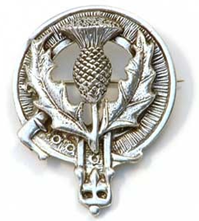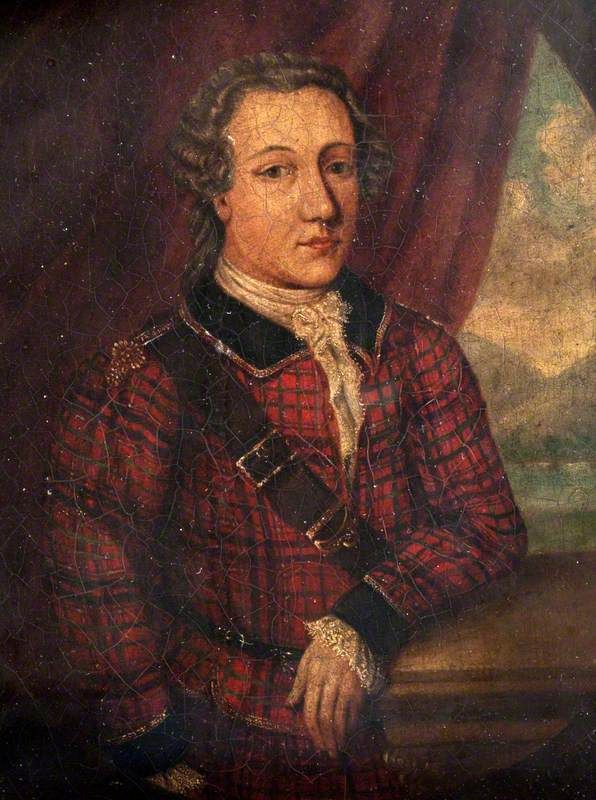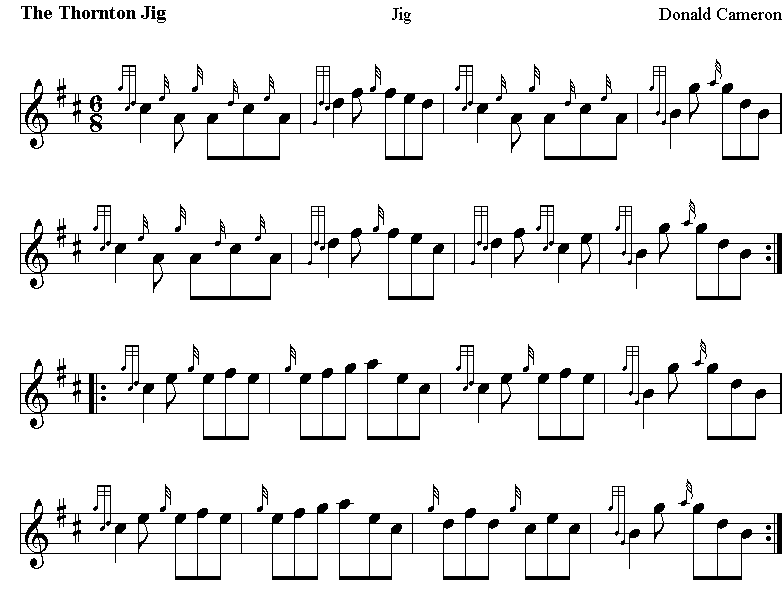 |
||

Best viewed in
|
The Thornton Jig is one of Donald Cameron's compositions. Donald Cameron was the greatest piper of his generation, and one of the most influential piping figures of the 19th century. He is thought to have been born at Contin near Strathpeffer in eastern Ross and Cromarty into the farming family of Colin and Mary Cameron. His younger brother Sandy would also become a leading piper and the subject of one of the great competition reels. On December 9, 1841 he married Margaret Mackenzie (1818-1877), who thus became Maggie Cameron, namesake of one of the most popular strathspeys. They had three sons – Colin (1843-1916), Alexander (Alick-1848-1923) and Keith (1855-1899) – all of whom became important pipers and teachers who carried the family legacy into the next century. It is said he could pipe by age eight, and by virtue of his talent was sent for tuition to Donald Mor MacLennan of Moy. He would later receive instruction from Angus MacKay and John Ban Mackenzie, two of the most important pipers of the age. He won the prize pipe at Inverness in 1843 and at Edinburgh in 1844. He won the Gold Medals at Inverness in 1849, 1850 and 1859. He won the new Champion of Champions contest sponsored by the Club of True Highlanders and held at Inverness in 1867. The winner of this event became known as the “King of Pipers.” While the event was short-lived – only five “King of Pipers” were named – the title adhered particularly closely to the legends of John Ban MacKenzie and Donald Cameron, and the latter has been known ever since as the King of Pipers. He was piper to various northern lairds but saw longest service as piper to Keith Stewart-MacKenzie of Seaforth at Brahan Castle near Dingwall from 1849 until his death. His influence as a teacher was far-reaching, and his pupils included his three sons as well as Alexander MacDonald (father of John MacDonald of Inverness), Donald MacKay (nephew of Angus MacKay) Alexander MacLennan and J. F. Farquharson. Donald Cameron’s fame was felt not only on the competition circuit and through his teaching, but in the piping repertoire as well. He wrote a small but significant number of light music tunes, including the strathspey “Brahan Castle” and “Lord Breadalbane’s March,” which was the forerunner of “Highland Wedding,” one of the greatest competition marches. His influence spread to the great piobaireachd compilers of the century, both through his own connections and through the playing and teaching of his sons. He was a personal friend of Angus MacKay. He knew and had access to the extensive collections of Donald MacDonald, and in 1853 he started his own manuscript collection of bagpipe music which he passed on to his son Colin. It is now in the National Library of Scotland and its 80 tunes form a significant resource for serious students of piobaireachd. Colin Cameron became known as the foremost living piobaireachd authority in the decades before his death in 1916 and he made important contributions to David Glen’s Ancient Piobaireachd (1880-1907) and General Thomason’s Ceol Mor (1900). Colin’s brother Alick would teach John MacDougall Gillies (1855-1925), whose influence in the early 1900s approached that of the great John MacDonald of Inverness. Much has been made of the ‘Cameron school’ of piobaireachd playing, so often set against the contemporary ‘MacPherson school’ which derived from the teaching of Malcolm MacPherson (‘Calum Piobaire, 1838-1898) and his descendants. In musical terms, the differences were minor, but they were magnified by adherents who promoted the superiority of their teachers long after the teachers were dead. Like most leading pipers and authorities, the principle figures in both camps found diverse influences and displayed a wide range of playing styles. Later attempts to standardize certain expressive characteristics of the Camerons and MacPhersons tended to polarize the playing styles in a way that did not exist when the prime movers were alive. According to the “Notices of Pipers” entry published in the Piping Times in April, 1968, Donald Cameron was “practically illiterate,” though he could read music, “but preferred to note his tunes in a form of canntaireachd.” He: was one of the very few who could keep up a continuous sound on the practice chanter. He was a shrewd, clever man, full of Highland lore and tradition; a keen angler…. In appearance, as in disposition, he was the ‘ideal successor of such hereditary pipers as the MacCrimmons, and we shall not look upon his like again.’ Personally he was a most congenial, unassuming man and benevolent to a fault. Donald Cameron died in Maryburgh, Scotland, on January 7, 1868 and was buried in the High Kirk, Inverness. The march to the cemetery was accompanied by piping by the leading players of the day.
|
|

